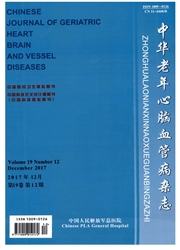

 中文摘要:
中文摘要:
目的探讨症状性大脑中动脉M1段闭塞后存活患者的预后及其危险因素。方法选取大脑中动脉M1段闭塞导致首次脑梗死且1个月时仍存活的患者126例,大脑中动脉M1段闭塞经脑血管造影证实,对患者进行随访研究,以脑卒中再发或死亡为终点事件。收集脑血管病的危险因素和血管病变特点,用单因素和多因素Cox回归模型进行危险因素分析。结果126例大脑中动脉闭塞后存活患者中,平均随访35.7个月(3~66个月),终点事件发生率为14.3%,其中脑梗死再发13例,死亡5例,脑出血2例。单因素和多因素分析显示,冠心病和伴其他血管狭窄数与患者预后明显相关(OR=8.893,95%CI:2.885~27.418,P=0.000)。结论症状性大脑中动脉M1段闭塞存活患者长期预后良好,影响患者预后的因素是冠心病和伴有其他脑血管病变。
 英文摘要:
英文摘要:
Objective To study the prognosis of survived patients with symptomatic occlusion in M1 segment of middle cerebral artery and its risk factors. Methods One hundred and twenty-six survived patients with cerebral infarction due to 1 month middle cerebral artery occlusion confirmed by digital subtract angiography were followed up. Relapse of cerebral stroke and death were considered as the end events. Risk factors for their cerebrovascular disease were analyzed with univariate and multivariate Cox regression model. Results The patients were followed up for 35.7 months(3-66 months). The incidence of end events was 14. 3%. Cerebral infarction recurred in 13 patients,5 patients died,and cerebral hemorrhage was found in 2 patients(1 died of cerebral hemorrhage,and 1 died of cerebral infarction). Univariate and multivariate Cox regression analysis showed that coronary artery disease and stenosis of other blood vessels were significantly related with the prognosis of patients (OR=8. 893,95 % CI.2. 885- 27. 418, P = 0. 000). Conclusion Prognosis of survived patients with symptomatic middle cerebral artery occlusion is good. The factors influencing the prognosis of patients are coronary artery disease and stenosis of other blood vessels.
 同期刊论文项目
同期刊论文项目
 同项目期刊论文
同项目期刊论文
 Neuroprotective effect of ginsenoside Rb1 on glutamate-induced neurotoxicity: With emphasis on autop
Neuroprotective effect of ginsenoside Rb1 on glutamate-induced neurotoxicity: With emphasis on autop A new approach with less damage: Intranasal delivery of tetracycline-inducible replication-defective
A new approach with less damage: Intranasal delivery of tetracycline-inducible replication-defective Association between plasma homocysteine levels and obstructive sleep apnoea in patients with ischaem
Association between plasma homocysteine levels and obstructive sleep apnoea in patients with ischaem Acidic fibroblast growth factor delivered intranasally induces neurogenesis and angiogenesis in rats
Acidic fibroblast growth factor delivered intranasally induces neurogenesis and angiogenesis in rats 期刊信息
期刊信息
